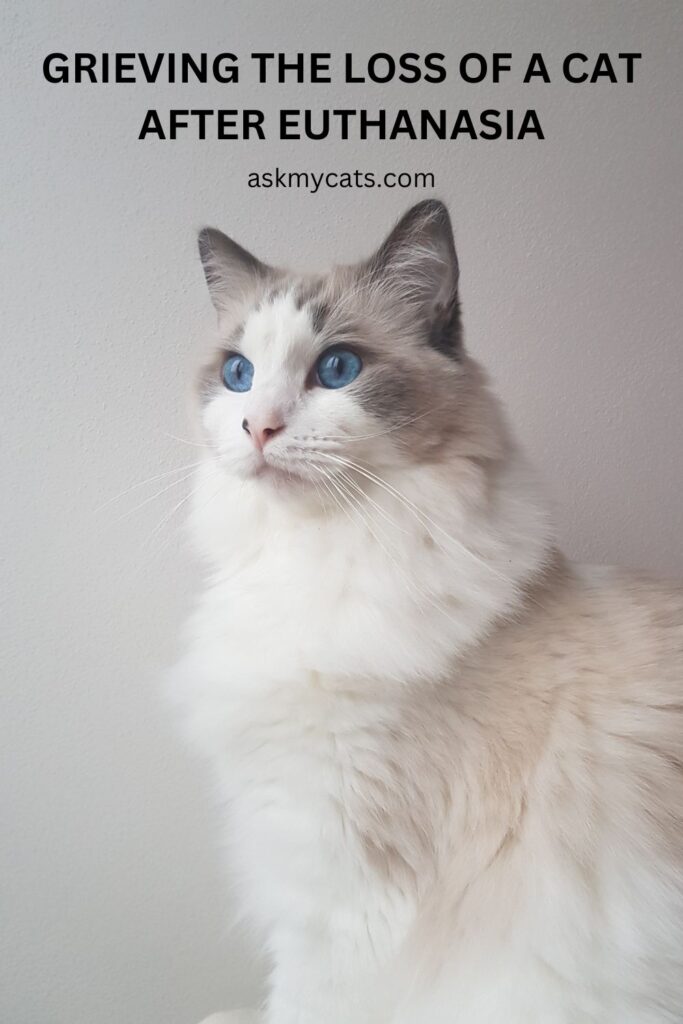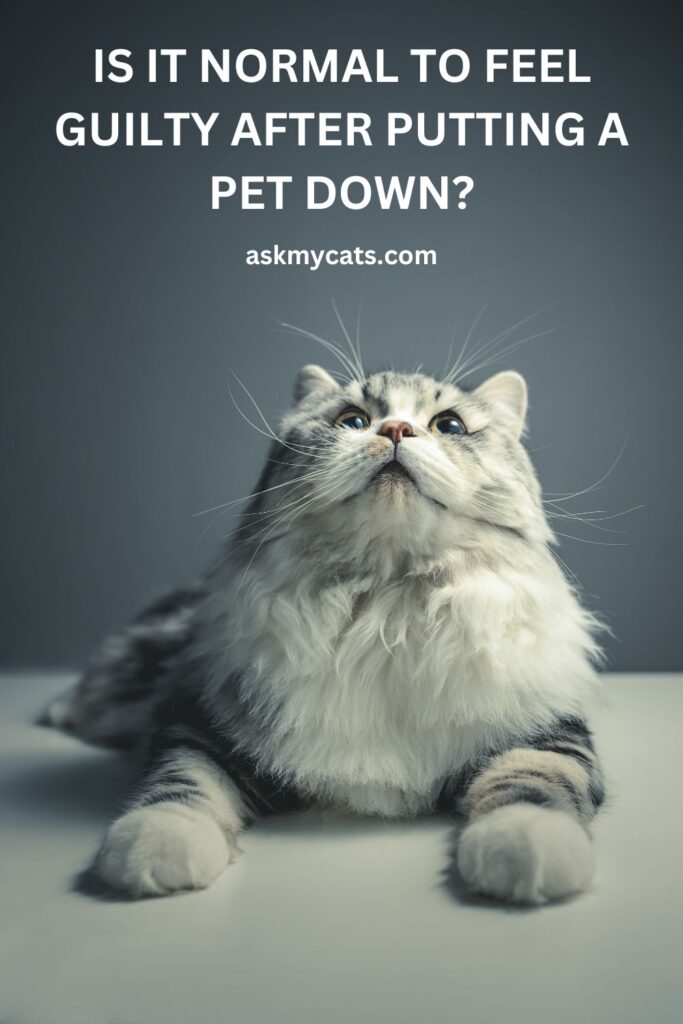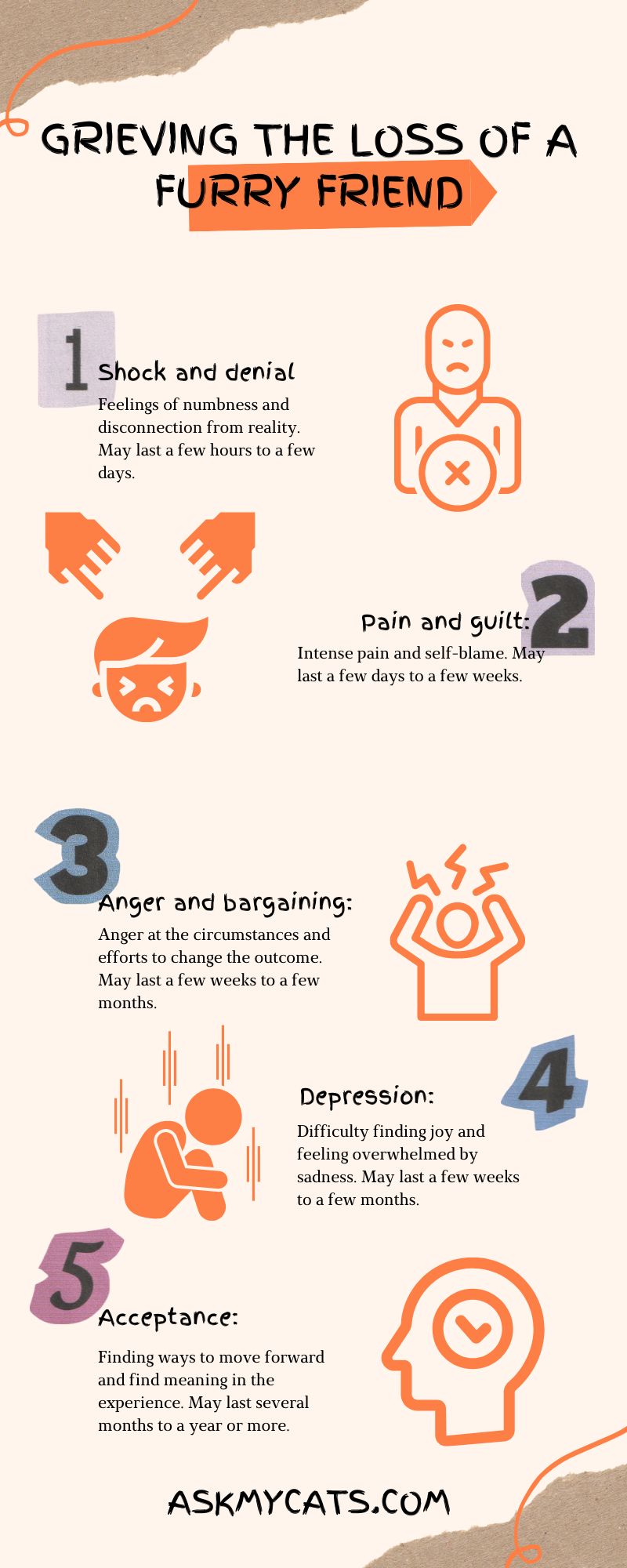Have you ever had to make the difficult decision to put your beloved feline friend to sleep?
Grieving the loss of a beloved cat after euthanasia is a difficult and emotional process. It’s natural to feel a range of emotions, including sadness, guilt, and even anger, as you cope with the loss of your furry friend.
It’s important to remember that euthanasia is often the kindest and most compassionate choice for a cat who is suffering from a terminal illness or other health problems that cannot be effectively treated.
In this article, we’ll explore some ways to cope with these difficult emotions and find ways to heal.
Whether you’re struggling with feelings of guilt or just trying to come to terms with the loss of your furry companion, we hope this article can provide some comfort and support during this tough time.
Key Takeaways
- Grieving the loss of a cat after euthanasia is a natural and emotional process
- It’s important to recognize and acknowledge your feelings, and give yourself time to grieve
- It can be helpful to talk to a trusted friend or family member or seek support from a therapist or other mental health professional
- Take care of yourself during this time, including getting enough sleep, eating well, and finding healthy ways to cope with your emotions
- It is normal to feel guilty after putting a pet down, especially if you made the decision to euthanize them
- Remember that euthanasia is a decision made out of love and compassion for your pet


Give Your Cat the Perfect Day
Get the Free Ebook!
Grieving The Loss Of A Cat After Euthanasia

One of the first steps in grieving the loss of a cat is to recognize and acknowledge your feelings. It’s okay to feel a range of emotions, and it’s important to give yourself time to grieve and process your loss.
It can be helpful to talk to a trusted friend or family member about your feelings or to seek support from a therapist or other mental health professional.
It’s also important to take care of yourself during this time. Grieving can be physically and emotionally draining, and it’s important to prioritize your own self-care.
This may include getting enough sleep, eating well, and finding healthy ways to cope with your emotions, such as through exercise, meditation, or creative outlets.
Statistics Alert
When it comes to end-of-life decisions for pets, the APPA survey found that the majority of pet owners (78%) choose euthanasia when their pet is suffering and has a poor quality of life.
It is common for pet owners to experience grief and loss after making the decision to put their pet to sleep. A study published in the Journal of Loss and Trauma found that the death of a pet can be as emotionally distressing as the loss of a human family member.
American Pet Products Association. (2022). 2021-2022 APPA National Pet Owners Survey & Risley-Curtiss, C., & Cordes, S. (2010). The human-animal bond and grief: A qualitative study. Journal of Loss and Trauma, 15(2), 112-126.
Interesting Read: Choosing the Right Euthanasia Option: At-Home Vs. Vet Clinic
Is It Normal To Feel Guilty After Putting A Pet Down?

It is normal to feel guilty after putting a pet down, especially if you were the one who made the decision to euthanize your pet.
Euthanasia is a difficult and emotional decision, and it’s natural to feel a sense of guilt or responsibility for your pet’s death.
There are many reasons why people may feel guilty after euthanizing a pet.
Some may feel that they should have done more to try to save their pet, or that they didn’t do enough to make their pet’s life comfortable.
Others may feel guilty for not being able to financially afford treatment or for not noticing their pet’s illness sooner.
It’s vital to keep in mind that, for a pet suffering from a terminal disease or other health issues that cannot be adequately addressed, euthanasia is sometimes the noblest and most humane course of action. It’s a decision that is made out of love and compassion, and it’s important to remind yourself of this.
If you’re struggling with feelings of guilt after euthanizing a pet, it may be helpful to talk to a trusted friend or family member about your feelings.
It can also be helpful to seek support from a therapist or other mental health professional. They can help you process your emotions and find healthy ways to cope with your loss.
Expert Quote
“Grieving the loss of a pet is a personal and sometimes private experience. It’s important to give yourself permission to feel and express your emotions and to take the time you need to heal.”
Dr. Caroline Coile, PhD, DVM, a veterinarian and author of more than 20 books on pet care
Must Read: Did I Put My Cat To Sleep Too Soon?
Timeline Of The Grieving Process After Putting Cat To Sleep
Check out the different stages of grief that a person may experience after putting a cat to sleep, along with how long each stage typically lasts.
1. Shock and denial:
In the initial stages of grief, it is common to feel numb and disconnected from reality. This can be a protective mechanism that helps us cope with the overwhelming emotions we are experiencing. This stage may last a few hours to a few days.
2. Pain and guilt:
As the reality of the loss sinks in, we may feel intense pain and may blame ourselves for the decision to put the cat to sleep. This stage may last a few days to a few weeks.
3. Anger and bargaining:
It is not uncommon to feel angry at the circumstances or at ourselves for making the decision to euthanize the cat. We may also try to bargain with ourselves or a higher power in an effort to change the outcome. This stage may last a few weeks to a few months.
4. Depression:
During this stage, we may feel overwhelmed by sadness and may have difficulty finding joy in things we used to enjoy. It is important to take care of ourselves and seek support during this time. This stage may last a few weeks to a few months.
5. Acceptance:
As we come to terms with the loss, we may start to find ways to move forward and find meaning in the experience. This stage may last several months to a year or more.
Quick Note
It’s important to note that everyone grieves differently and there is no “right” way to go through the grieving process. These stages are just a general guide and may not apply to everyone.
Check out the in-depth guide: When To Put Your Cat Down? The Complete Checklist
Common Emotions Experienced After Putting a Cat to Sleep
| Emotion | Description |
|---|---|
| Sadness | A feeling of melancholy or unhappiness |
| Guilt | A feeling of responsibility for something that has happened |
| Anger | A feeling of resentment or frustration |
| Relief | A feeling of release from a burden or responsibility |
Must Read: The Impact Of Euthanasia Of Cat On Children
Will My Cat Forgive Me For Putting Her To Sleep?
Some cats appear to be aware of their illness and the fact that euthanasia is a method to put an end to their misery.
As a form of farewell, these cats frequently purr and brush up on their humans. Other cats could be more adamant about not being put to sleep; they might growl, hiss, or even try to bite.
In the end, it is impossible to predict how your cat will feel about being put to sleep.
However, if you’ve chosen to put your cat to sleep, you probably did so because you think it’s in her best interests. Your cat may not forgive you in this life, but she will undoubtedly properly understand.
Interesting Read: How To Euthanize A Cat With Over-The-Counter Drugs?
Does God Forgive Me To Put My Cat To Sleep?

The wild creatures under God’s direct control, such as sparrows and other animals, are taken care of. Additionally, He gives us the responsibility of caring for other creatures, notably our working animals, cattle, and pets.
When we practice godly care, cruelty has no place, as the author of Proverbs tells us.
As Christians, we should be careful to prevent animal cruelty towards the end of a pet’s life just as we should be careful to reject cruelty to animals during their lives (via neglect, abuse, or forced combat).
Some pet owners may make the moral decision to solely allow their animals to pass away naturally, and it is a choice that is respectable as long as the animals are being given sufficient care.
Never make the hasty choice to put a dog or cat to sleep or give up a healthy pet only for the sake of convenience. Such egotistical thinking would be incompatible with godly stewardship.
However, it is a morally acceptable option to put a pet to sleep when the decision is motivated by a wish to relieve the animal’s suffering.
No matter what decision you make for your own pet, remember that God has given you the power to make it. All He wants is that you to uphold His image by giving your pet the respect and care they need, even in their final days.
Expert Quote
“Pets are such an important part of our lives, and their loss can be devastating. It’s natural to feel a sense of grief, just like you would after losing a human family member. It’s important to allow yourself to feel and process these emotions, and to seek support if you need it.”
Dr. Jessica Vogelsang, DVM, a veterinarian
Interesting Read: How To Euthanize A Cat At Home?
How Do You Get Over Putting Your Cat To Sleep?
Many people find it helpful to find ways to honor their cat’s memory. This can include creating a special memorial or tribute, such as a scrapbook or photo album, or participating in activities that remind them of their furry friend.
Some people find solace in adopting a new cat, while others prefer to simply cherish the memories they have of their beloved pet.
1. Acknowledge and accept your feelings
It’s also important to remember that it’s normal to experience a range of emotions as you grieve the loss of your cat.
Don’t try to push these emotions away or pretend they don’t exist. It’s important to allow yourself to feel and process them. Bottling up your feelings will only make it harder to move on.
You may feel waves of sadness, or you may feel numb or disconnected. It’s important to be patient with yourself and to allow yourself the time you need to grieve.
2. Seek support
This can be a tough time, so it’s important to have someone to talk to about your feelings. Whether it’s a trusted friend or family member, don’t be afraid to reach out for support.
If you’re struggling to cope with the loss of your cat, it may be helpful to seek support from trusted friends, family members, or mental health professionals. They can provide a listening ear, offer words of comfort, and help you find healthy ways to cope with your loss.
If you’re finding it hard to cope, consider seeking the help of a professional therapist or counselor.
A mental health professional can provide a safe and supportive space to process your emotions and help you find healthy ways to cope. Don’t be afraid to reach out for additional support if you need it.
Interesting Read: Should I Stay With My Cat When It Is Euthanized?
3. Find ways to honor and remember your cat
One way to cope with the loss of your cat is to find ways to honor their memory. This can be a small gesture or something more significant, it’s up to you.
You could create a memorial or altar for your cat. This could be a special spot in your home where you can reflect on the good times you shared. You could include items that were meaningful to both you and your cat, such as pictures, toys, or other mementos.
Sharing memories and stories of your cat with others can be a way to keep their memory alive. Whether it’s talking to friends and family, or even posting about your cat on social media, sharing your memories can be a comforting way to honor your cat.
If you’re looking for a more tangible way to remember your cat, you could donate to an animal shelter or rescue organization in their memory. This can be a way to pay tribute to your cat and help other animals in need.
Interesting Read: Heartfelt Ideas for Cat Memorials
our Recommendation
Honor your beloved feline companion with a beautiful cat memorial from Cat Memorials & Funerary.
Check out the best memory you can have of your cat.
4. Practice self-care
It’s important to take care of yourself during this difficult time. Give yourself permission to rest and recharge. It’s okay to take a break from your normal routine and allow yourself to heal.
Engage in activities that bring you comfort and joy. This could be something as simple as curling up with a good book or watching a movie, or something more active like going for a walk or practicing a hobby. Do what feels good to you.
Don’t be afraid to seek support from others as needed. Lean on your loved ones for emotional support, or consider finding a support group for people who are grieving the loss of a pet. It can be helpful to connect with others who are going through a similar experience.
5. Look to the future
It’s natural to feel a sense of loss after putting your cat to sleep, but it’s important to also recognize the love and joy that they brought to your life. Your cat was a special companion and their memory will always be with you.
It’s okay to move on and find joy in other aspects of your life. It doesn’t mean that you’re forgetting about your cat, it just means that you’re finding ways to be happy again.
Consider adopting another pet in the future, if you feel ready and it is the right decision for you. Having a new companion can bring joy and purpose back into your life, and can also be a way to honor the memory of your previous cat. Just be sure to take the time to grieve and heal before making any big decisions.
Interesting Read: What Are The Different Methods Of Cat Euthanasia?
Resources For Coping With The Loss Of A Cat
- Pet loss support groups
- Pet loss hotlines
- Online pet loss forums and communities
- Pet grief counseling or therapy
- Pet memorialization options such as pet cremation or burial.
How To Help Other Family Members Cope With The Loss Of Cat
- Encourage them to express their feelings and emotions
- Plan a special activity or event in honor of the pet
- Help them create a memory book or photo album
- Seek counseling or therapy services for the whole family
- Provide them with resources and support groups to help them cope with the loss.
Interesting Read: Did My Cat Know He Was Being Put To Sleep?
Ways to Honor and Remember Your Cat
| Idea | Description |
|---|---|
| Create a memorial or altar | Set aside a special spot in your home with mementos of your cat. |
| Share memories and stories | Talk to others about your cat and share memories of your time together. |
| Donate in their memory | Make a donation to an animal shelter or rescue organization in your cat’s memory. |
| Get a tattoo or piece of jewelry | Get a permanent reminder of your cat in the form of a tattoo or piece of jewelry. |
| Plant a tree or garden | Plant a tree or create a garden in your cat’s memory. |
Find Solution: My Cat Is Dying And I Have No Money!
Frequently Asked Questions
How do I get over the guilt of putting my cat down?
Recall the enjoyable experiences you had with your pet. Keep in mind how much they trusted and loved you. Try to forgive yourself as well. While the guilt might not go away right away, it will undoubtedly fade with time if you keep in mind the validity of your choice.
Interesting Read: Is It Legal To Euthanize A Healthy Cat?
Final Words

Ultimately, it should be remembered that putting a beloved cat to sleep is a hard and emotional process that calls for patience, self-care, and support.
It’s critical to acknowledge your emotions, take care of yourself, and develop good coping mechanisms for your loss. Always be kind to yourself and ask for help when you need it.
Interesting Read: Role of Veterinary Doctor In Euthanasia
A Cat Owner’s Final Guide: What To Do After Cat Euthanasia?
Also Read: Where To Euthanize A Cat For Free Or Cheap?
You might also like to read: How Much Does It Cost To Euthanize A Cat?
You Might Also Like To Read:
- When To Euthanize A Cat With Cancer?
- When To Euthanize A Cat With Seizures?
- When To Euthanize A Cat With IBD?
- When To Euthanize A Cat With Kidney Failure?
- When To Euthanize A Cat With Feline Leukemia?
- When To Euthanize A Cat With Heart Failure?
- When To Euthanize A Cat With FIP?
- When To Euthanize A Cat With FIV?
- When To Euthanize A Cat With Dementia?
- When To Euthanize A Cat With Arthritis?
- When To Euthanize A Cat With Hyperthyroidism?
